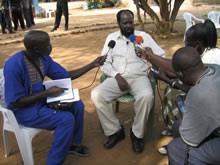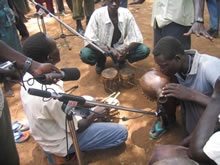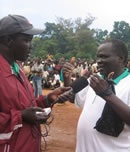Sudan Radio Service
Bringing vital news and information to the citizens of Sudan
March 2006

SRS producers speak with Government of Souther Sudan's President Salva Kiir.
Emerging from decades of civil war, the people of Sudan are struggling to rebuild their society. Yet basic services such as paved roads, hospitals, and schools are scarce or nonexistent, making civic participation and development across the region a daunting challenge. With funding from USAID, the International Education Systems Division (IES) of EDC has developed Sudan Radio Service (SRS), the first independent and unbiased radio service to reach across the country with accurate news and information.
“The Sudan has no history of independent media,” says EDC’s Jeremy Groce. “Until now, radio in Sudan has been used as a propaganda tool by the government or the rebels. It is exciting to be the first source of trustworthy information.”
Modeled after BBC World Service, SRS broadcasts six hours a day, providing in-depth coverage of the peace process, implementation of the Comprehensive Peace Agreement signed in January 2005, and developments in the new Government of Southern Sudan in the south and Government of National Unity in the north. SRS also produces regular programs on health, agriculture, development issues, current events, and civics. Broadcasts are transmitted daily in English, Arabic, and Juba Arabic, as well as in a different local language each day.
The service provides programming on many topics that are vital to the new development and governance of the region. In addition to daily newscasts, SRS provides civics programming in every language. Called “The Road to Peace,” the program reports on the implementation of the peace accords between north and south, information on new citizen rights and responsibilities, and the work of the new governments. “Before [SRS began operating] most people heard only rumors and misinformation about the peace process,” says Groce. “Now people are able to follow the peace process and the new government. We believe we are helping to keep the government honest and accountable.”
"Health for All by All,” a regular health education feature, provides up-to-date information on pressing health topics such as malaria and HIV/AIDS. When an epidemic of cholera broke out in early 2006 killing scores of people, SRS was the only mass media warning of the dangers and providing information on prevention and sanitation.

SRS records local, traditional musicians as part of its commitment to entertainment and cultural programming.
SRS adopts a journalistic approach to programming, often producing multipart series on different topics. For instance, after the peace accords were signed, both sides began the process of disarming, demobilizing, and reintegrating (DDR) their soldiers. SRS spoke with the DDR chiefs for both the north and the south to hear their views on how the process would evolve. Reporters also interviewed soldiers and community leaders about the impact DDR would likely have across the Sudan.
The Service also covers the ongoing conflict in Darfur. Because travel in that region is difficult, reporters rely more heavily on telephone contacts and interviews at other locations for their stories, explains Groce. “We have many listeners in Darfur and get a lot of feedback from them. We also hear from leaders within the rebel Sudan Liberation Movement who wish to express their side of the issues to our listeners.”
A Studio in Exile
Groce oversees SRS in Nairobi, Kenya, with a staff of 31 Sudanese men and women. “We have technicians and producers here in the studios as well as reporters in the field. Someone has the health beat, the education beat, the civics beat—but we all do a little bit of everything and we’re all involved in producing the news every day,” he says. Groce trained the editorial staff in the tenets of basic journalism—that reporters strive to be independent, unbiased, balanced, and factual. “We looked for people with good language skills and a lot of energy and trained them from the ground up,” he says.

SRS Producer Benjamin Mathiang speaks with Maridi County's SPLM Officer for Culture and Information, Juma Michael.
On the production side, a team of 17 producers create newscasts and programming on several topics in several languages each day at SRS’s studios in Nairobi. When the daily broadcast is complete, three Sudanese technicians edit and build the program into audio files that are sent electronically to London for broadcast. Project staff hope to relocate their operation to Sudan soon, but are waiting to see what media protections the new government will establish. “Our number one goal is to get information out to the people,” says Groce. “The country is still in transition and until some protections for the media are in place, we will stay in Nairobi.”
Expanding access
Though SRS is not able to determine the number of listeners in its audience, radios are far more available across the country than print media. The region’s few newspapers are limited in reach by a lack of infrastructure for distribution as well as illiteracy rates that run as high as 80-90 percent. Radio access, by contrast, is as high as 80 percent in the towns, though that number drops off significantly in the countryside.
By broadcasting the news in 10 languages every week, SRS is also expanding its reach to many people formerly excluded from media of any sort, particularly women who typically speak only the local language, according to Groce. “Women have told us that in the past radio always belonged to men. Traditionally men listen to the radio and explain what is being said to women. Now women can listen to the news and other programming in their own languages.” The broadcast is also reaching Sudanese refugees living in other parts of the continent, according to Groce. “We met some Sudanese men living in Central African Republic who had heard the broadcast in Zande, their local language. They told us that it brought tears to their eyes to hear their own language spoken on the radio.”
For more information, please contact:
- Kent Noel, Project Director, knoel@edc.org
- Jeremy Groce, Chief of Party and Radio Programming Advisor, jgroce@edc.org
- Abdenour Boukamhi, Project Coordinator, aboukamhi@edc.org
